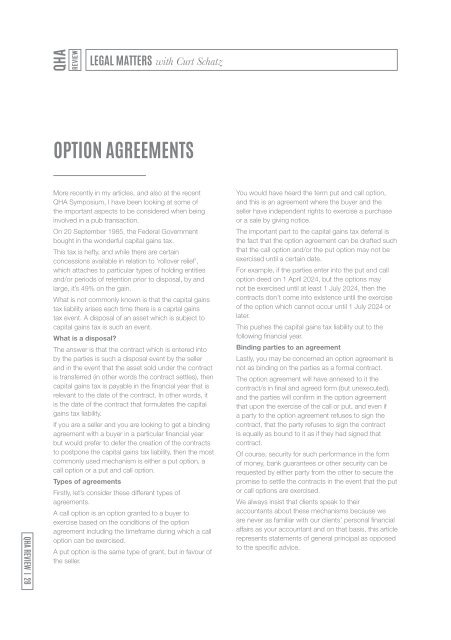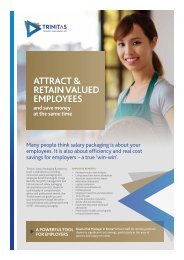QHA-Review_April_Digital
- No tags were found...
Create successful ePaper yourself
Turn your PDF publications into a flip-book with our unique Google optimized e-Paper software.
LEGAL MATTERS with Curt Schatz<br />
OPTION AGREEMENTS<br />
<strong>QHA</strong> REVIEW | 28<br />
More recently in my articles, and also at the recent<br />
<strong>QHA</strong> Symposium, I have been looking at some of<br />
the important aspects to be considered when being<br />
involved in a pub transaction.<br />
On 20 September 1985, the Federal Government<br />
bought in the wonderful capital gains tax.<br />
This tax is hefty, and while there are certain<br />
concessions available in relation to ‘rollover relief’,<br />
which attaches to particular types of holding entities<br />
and/or periods of retention prior to disposal, by and<br />
large, it’s 49% on the gain.<br />
What is not commonly known is that the capital gains<br />
tax liability arises each time there is a capital gains<br />
tax event. A disposal of an asset which is subject to<br />
capital gains tax is such an event.<br />
What is a disposal?<br />
The answer is that the contract which is entered into<br />
by the parties is such a disposal event by the seller<br />
and in the event that the asset sold under the contract<br />
is transferred (in other words the contract settles), then<br />
capital gains tax is payable in the financial year that is<br />
relevant to the date of the contract. In other words, it<br />
is the date of the contract that formulates the capital<br />
gains tax liability.<br />
If you are a seller and you are looking to get a binding<br />
agreement with a buyer in a particular financial year<br />
but would prefer to defer the creation of the contracts<br />
to postpone the capital gains tax liability, then the most<br />
commonly used mechanism is either a put option, a<br />
call option or a put and call option.<br />
Types of agreements<br />
Firstly, let’s consider these different types of<br />
agreements.<br />
A call option is an option granted to a buyer to<br />
exercise based on the conditions of the option<br />
agreement including the timeframe during which a call<br />
option can be exercised.<br />
A put option is the same type of grant, but in favour of<br />
the seller.<br />
You would have heard the term put and call option,<br />
and this is an agreement where the buyer and the<br />
seller have independent rights to exercise a purchase<br />
or a sale by giving notice.<br />
The important part to the capital gains tax deferral is<br />
the fact that the option agreement can be drafted such<br />
that the call option and/or the put option may not be<br />
exercised until a certain date.<br />
For example, if the parties enter into the put and call<br />
option deed on 1 <strong>April</strong> 2024, but the options may<br />
not be exercised until at least 1 July 2024, then the<br />
contracts don’t come into existence until the exercise<br />
of the option which cannot occur until 1 July 2024 or<br />
later.<br />
This pushes the capital gains tax liability out to the<br />
following financial year.<br />
Binding parties to an agreement<br />
Lastly, you may be concerned an option agreement is<br />
not as binding on the parties as a formal contract.<br />
The option agreement will have annexed to it the<br />
contract/s in final and agreed form (but unexecuted),<br />
and the parties will confirm in the option agreement<br />
that upon the exercise of the call or put, and even if<br />
a party to the option agreement refuses to sign the<br />
contract, that the party refuses to sign the contract<br />
is equally as bound to it as if they had signed that<br />
contract.<br />
Of course, security for such performance in the form<br />
of money, bank guarantees or other security can be<br />
requested by either party from the other to secure the<br />
promise to settle the contracts in the event that the put<br />
or call options are exercised.<br />
We always insist that clients speak to their<br />
accountants about these mechanisms because we<br />
are never as familiar with our clients’ personal financial<br />
affairs as your accountant and on that basis, this article<br />
represents statements of general principal as opposed<br />
to the specific advice.
















